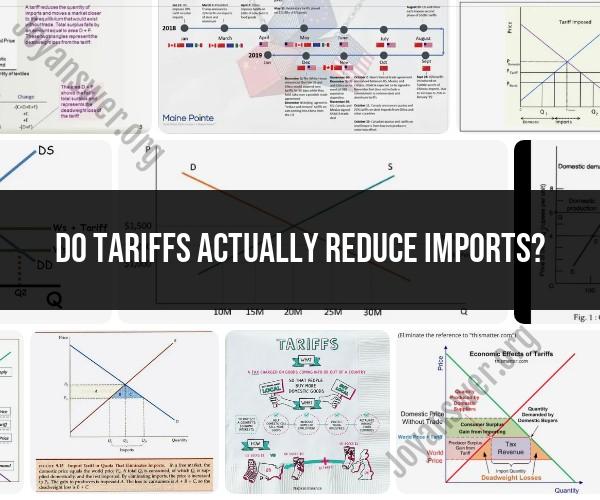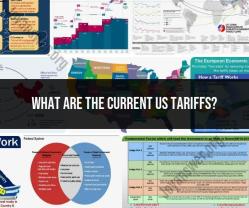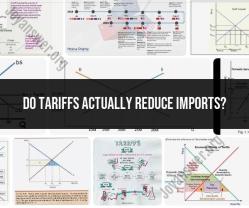Do tariffs actually reduce imports?
Tariffs can impact imports in various ways, but the relationship between tariffs and imports is more nuanced than a simple reduction. Here are some key points to consider:
Impact on Import Prices: Tariffs are taxes imposed on imported goods. When a tariff is imposed, it typically increases the price of the imported product because the cost of the tariff is often passed on to consumers. Higher prices can reduce the demand for the imported goods, leading to a decrease in imports, especially for price-sensitive products.
Impact on Consumer Choices: As import prices rise due to tariffs, consumers may shift their preferences to domestically produced goods or substitute with alternative imported goods that are not subject to tariffs. This can result in changes in the composition of imports.
Impact on Exporting Countries: Tariffs can negatively affect the economies of exporting countries that rely heavily on trade with the tariff-imposing country. These countries may experience a reduction in exports and may respond with retaliatory tariffs on imports from the tariff-imposing country.
Impact on Trade Balance: The overall impact on a country's trade balance (the difference between exports and imports) depends on various factors, including the price elasticity of demand for the affected products, the availability of substitutes, and the response of trading partners. Tariffs can lead to a reduction in imports, but they may also result in reduced exports if trading partners retaliate.
Trade Diversion: In some cases, tariffs can lead to trade diversion, where imports from one trading partner decrease while imports from another, unaffected trading partner increase. This can happen when a country imposes tariffs on one source of imports but continues to import the same goods from another source with lower or no tariffs.
Effects on Global Supply Chains: Tariffs can disrupt global supply chains, especially for industries that rely on imported intermediate goods. This can impact the cost and availability of production inputs, potentially affecting domestic manufacturing and employment.
Economic Efficiency: Economists often argue that tariffs are generally inefficient because they can lead to higher prices for consumers, reduce competition, and distort resource allocation. They may protect certain domestic industries but can come at the cost of overall economic efficiency.
In summary, while tariffs can have an impact on imports by raising the cost of imported goods and potentially reducing their demand, the extent of the impact depends on various factors, including consumer behavior, the availability of substitutes, and the responses of trading partners. Tariffs can be a tool used by governments to achieve specific economic and trade policy objectives, but their effects on imports and overall economic outcomes can be complex and multifaceted.
The Impact of Tariffs on Imports: Do They Actually Reduce Imports?
Tariffs are taxes imposed on imported goods. They are often used to protect domestic industries from foreign competition. Tariffs can make imported goods more expensive, which can lead to a decrease in demand for those goods. This can lead to a reduction in imports, but the effect is not always straightforward.
There are a number of factors that can affect the impact of tariffs on imports, including:
- The size of the tariff: Larger tariffs tend to have a greater impact on imports.
- The elasticity of demand for the imported goods: If the demand for the imported goods is elastic (meaning that consumers are sensitive to price changes), then a tariff is more likely to lead to a reduction in imports.
- The availability of substitutes: If there are close substitutes for the imported goods that are not subject to tariffs, then consumers are more likely to switch to those substitutes, which can lead to a reduction in imports.
- The response of foreign producers: Foreign producers may respond to tariffs by lowering their prices or by moving their production to other countries. This can reduce the impact of tariffs on imports.
Trade Policy Effects: Analyzing the Influence of Tariffs on Imports
The impact of tariffs on imports has been studied by economists for many years. The consensus is that tariffs do tend to reduce imports, but the effect is not always large.
One study found that a 10% increase in tariffs reduces imports by about 3%. However, the effect varied depending on the industry. For example, tariffs had a greater impact on imports of consumer goods than on imports of capital goods.
Another study found that tariffs can have a negative impact on economic growth. The study found that a 10% increase in tariffs reduces GDP by about 0.5%.
Tariffs and International Trade: Evaluating Their Effects on Import Volumes
Tariffs can have a number of negative effects on import volumes. First, tariffs can make imported goods more expensive, which can lead to a decrease in demand for those goods. Second, tariffs can reduce competition in the domestic market, which can lead to higher prices and lower quality goods. Third, tariffs can lead to retaliation from other countries, which can escalate trade tensions and reduce global trade.
However, tariffs can also have some positive effects on import volumes. First, tariffs can protect domestic industries from foreign competition, which can lead to job creation and economic growth. Second, tariffs can generate revenue for the government, which can be used to fund public programs. Third, tariffs can be used to negotiate trade agreements with other countries.
Overall, the impact of tariffs on import volumes is complex and depends on a number of factors. Tariffs can have both negative and positive effects, and the balance between these effects will vary depending on the specific circumstances.
Conclusion
Tariffs can be a powerful tool for trade policy, but they should be used with caution. Tariffs can have both negative and positive effects, and the balance between these effects will vary depending on the specific circumstances.







